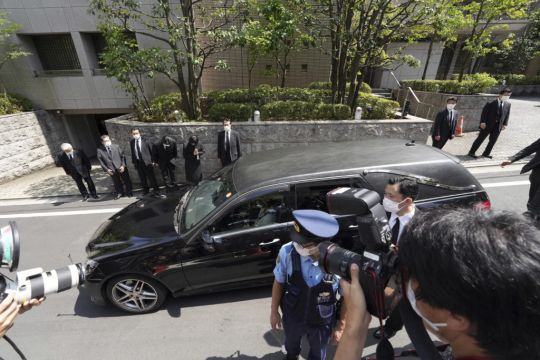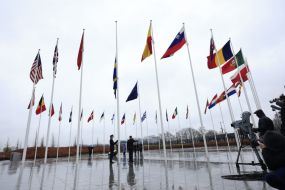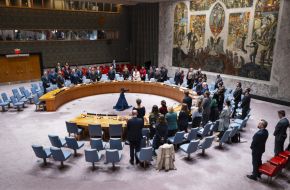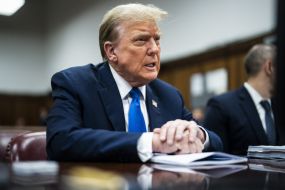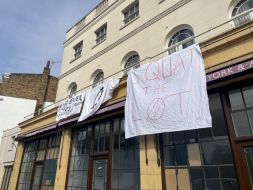The body of Japan’s former prime minister Shinzo Abe has returned to Tokyo a day after he was fatally shot during a campaign speech.
Mr Abe, 67, was attacked in the western city of Nara and airlifted to a local hospital but died of blood loss despite emergency treatment including massive blood transfusions.
Police at the scene arrested Tetsuya Yamagami, 41, a former member of Japan’s navy, on suspicion of murder. Police confiscated a homemade gun used in the attack, and several others were later found at his home.
The attacker told investigators he plotted the shooting because he believed rumours that Mr Abe was connected to an organisation that he resents, according to police. Japanese media reported the man had developed hatred towards a religious group his mother was devoted to.
The reports did not specify the group.

A black hearse carrying Mr Abe’s body and accompanied by his wife Akie arrived at his home in Tokyo’s upscale residential area of Shibuya on Saturday, where many mourners waited and lowered their heads as the vehicle passed.
Mr Abe’s assassination ahead of Sunday’s parliamentary election shocked the nation and raised questions over whether security for the former prime minister was adequate.
Police on Saturday said a post-mortem examination showed a bullet that entered Mr Abe’s upper left arm damaged arteries beneath both collar bones, causing fatal massive bleeding.
Some observers who watched videos of the assassination on social media and television noted a lack of attention in the open space behind Mr Abe as he spoke.
Fumikazu Higuchi, a former Kyoto prefectural police investigator, said the footage suggested security was sparse at the event and insufficient for a former prime minister.
“It is necessary to investigate why security allowed Yamagami to freely move and go behind Mr Abe,” Mr Higuchi told a Nippon TV talk show.
Experts also said Mr Abe was more vulnerable standing at ground level, instead of on top of a campaign vehicle, which reportedly could not be arranged because his visit to Nara was hastily planned the day before.

In videos circulating on social media, the attacker, identified as Tetsuya Yamagami, 41, can be seen with the homemade gun hanging from his shoulder, standing only a few metres behind Mr Abe across a busy street, and continuously glancing around.
A few minutes after Mr Abe stood at the podium and started his speech, Yamagami can be seen firing the first shot, which issued a cloud of smoke, but the projectile apparently missed Mr Abe.
As Mr Abe turned to see where the noise came from, a second shot went off. That shot apparently hit his left arm, missing a bulletproof briefcase raised by a security guard who stood behind the former leader.
Mr Abe fell to the ground, with his left arm tucked in as if to cover his chest. Campaign organisers shouted through loudspeakers asking for medical experts to provide first aid to Mr Abe, whose heart and breathing had stopped by the time he was airlifted to hospital.
According to the Asahi newspaper, Yamagami was a contract worker at a warehouse in Kyoto where he was a forklift operator and known as a quiet person who did not mingle with his colleagues.
A next-door neighbour at his home told Asahi he never met Yamagami, though he recalled hearing noises like a saw being used several times late at night over the past month.
Even though he was out of office, Mr Abe was still highly influential in the governing Liberal Democratic Party and headed its largest faction, but his ultra-nationalist views made him a divisive figure to many.
When he resigned as prime minister in 2020, Mr Abe was Japan’s longest-serving leader.

He blamed a recurrence of the ulcerative colitis he had had since he was a teenager. He said then it was difficult to leave many of his goals unfinished, especially his failure to resolve the issue of Japanese abducted years ago by North Korea, a territorial dispute with Russia, and a revision of Japan’s war-renouncing constitution.
Japanese Prime Minister Fumio Kishida and his Cabinet ministers hastily returned to Tokyo from campaign events elsewhere after the shooting, which he called “dastardly and barbaric”.
Mr Kishida pledged the election, which chooses members of Japan’s less-powerful upper house of parliament, will go on as planned on Sunday.
Tributes to Mr Abe have poured in from world leaders, with many expressing shock and sorrow.
US President Joe Biden hailed Mr Abe and said “his vision of a free and open Indo-Pacific will endure”.
He added: “Above all, he cared deeply about the Japanese people and dedicated his life to their service.”
Former German chancellor Angela Merkel, whose tenure from 2005 to 2021 largely overlapped with Mr Abe’s, said she was devastated by the “cowardly and vile assassination”.
Indian Prime Minister Narendra Modi declared Saturday a day of national mourning for Mr Abe, and UN Secretary-General Antonio Guterres tweeted that he would remember him for “his collegiality & commitment to multilateralism”.
